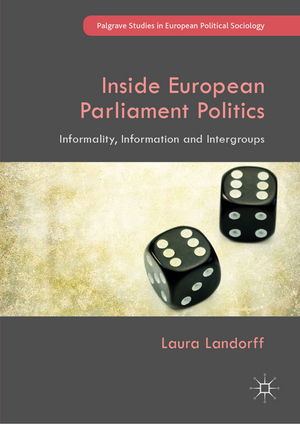Inside European Parliament Politics: Informality, Information and Intergroups: Palgrave Studies in European Political Sociology
Autor Laura Landorffen Limba Engleză Hardback – 5 mar 2019
Din seria Palgrave Studies in European Political Sociology
-
 Preț: 399.62 lei
Preț: 399.62 lei - 15%
 Preț: 643.48 lei
Preț: 643.48 lei - 18%
 Preț: 1005.43 lei
Preț: 1005.43 lei -
 Preț: 392.75 lei
Preț: 392.75 lei - 15%
 Preț: 583.13 lei
Preț: 583.13 lei - 15%
 Preț: 696.96 lei
Preț: 696.96 lei - 15%
 Preț: 503.52 lei
Preț: 503.52 lei -
 Preț: 385.47 lei
Preț: 385.47 lei - 18%
 Preț: 784.48 lei
Preț: 784.48 lei - 18%
 Preț: 1003.38 lei
Preț: 1003.38 lei -
 Preț: 419.85 lei
Preț: 419.85 lei - 18%
 Preț: 738.52 lei
Preț: 738.52 lei -
 Preț: 381.21 lei
Preț: 381.21 lei - 18%
 Preț: 953.97 lei
Preț: 953.97 lei - 18%
 Preț: 725.39 lei
Preț: 725.39 lei - 15%
 Preț: 646.94 lei
Preț: 646.94 lei - 15%
 Preț: 584.92 lei
Preț: 584.92 lei -
 Preț: 227.81 lei
Preț: 227.81 lei - 15%
 Preț: 585.40 lei
Preț: 585.40 lei - 15%
 Preț: 469.22 lei
Preț: 469.22 lei - 18%
 Preț: 781.94 lei
Preț: 781.94 lei - 15%
 Preț: 525.85 lei
Preț: 525.85 lei - 15%
 Preț: 696.35 lei
Preț: 696.35 lei - 15%
 Preț: 698.62 lei
Preț: 698.62 lei - 15%
 Preț: 698.15 lei
Preț: 698.15 lei - 18%
 Preț: 791.40 lei
Preț: 791.40 lei - 15%
 Preț: 472.51 lei
Preț: 472.51 lei -
 Preț: 384.31 lei
Preț: 384.31 lei -
 Preț: 389.70 lei
Preț: 389.70 lei - 15%
 Preț: 695.48 lei
Preț: 695.48 lei -
 Preț: 426.34 lei
Preț: 426.34 lei - 15%
 Preț: 704.87 lei
Preț: 704.87 lei -
 Preț: 390.84 lei
Preț: 390.84 lei - 18%
 Preț: 729.53 lei
Preț: 729.53 lei -
 Preț: 387.75 lei
Preț: 387.75 lei - 15%
 Preț: 702.54 lei
Preț: 702.54 lei - 15%
 Preț: 700.94 lei
Preț: 700.94 lei -
 Preț: 391.22 lei
Preț: 391.22 lei
Preț: 586.23 lei
Preț vechi: 689.68 lei
-15% Nou
Puncte Express: 879
Preț estimativ în valută:
112.18€ • 117.42$ • 93.37£
112.18€ • 117.42$ • 93.37£
Carte tipărită la comandă
Livrare economică 31 martie-14 aprilie
Preluare comenzi: 021 569.72.76
Specificații
ISBN-13: 9783030042059
ISBN-10: 3030042057
Pagini: 204
Ilustrații: XV, 258 p. 4 illus., 1 illus. in color.
Dimensiuni: 148 x 210 x 22 mm
Greutate: 0.48 kg
Ediția:1st ed. 2019
Editura: Springer International Publishing
Colecția Palgrave Macmillan
Seria Palgrave Studies in European Political Sociology
Locul publicării:Cham, Switzerland
ISBN-10: 3030042057
Pagini: 204
Ilustrații: XV, 258 p. 4 illus., 1 illus. in color.
Dimensiuni: 148 x 210 x 22 mm
Greutate: 0.48 kg
Ediția:1st ed. 2019
Editura: Springer International Publishing
Colecția Palgrave Macmillan
Seria Palgrave Studies in European Political Sociology
Locul publicării:Cham, Switzerland
Cuprins
1 Introduction.- 2 Opening up institutional black boxes: The European Parliament from a Sociological Perspective.- 3 Intergroups in the European Parliament: Institutionalisation and Regulation.- 4 Who are the MEPs Making up Intergroups? A Socio-Political Analysis.- 5 Finding Allies: The Intergroup as Bridging Social Capital.- 6 Seeking Information: The Intergroup as Informational Capital.- 7 Conversion and Mobilisation of Political Capital.- 8 Conclusion.
Notă biografică
Laura Landorff is Assistant Professor in European Studies at the Department of Culture and Global Studies at the University of Aalborg, Denmark. Her research focuses on the European Parliament, informal politics, political sociology and European integration.
Textul de pe ultima copertă
The study of the informal dimension of EU politics is more important than ever in order to understand how the EU system works. This book presents an innovative and original study on informal cross-party, cross-committee groupings in the European Parliament, so-called Intergroups. Building on extensive fieldwork, including semi-structured interviews and observations, this study shows how parliamentarians of the seventh European Parliament (2009-2014) gain a variety of social resources, such as social, informational and political capital, in Intergroups, which they subsequently mobilise to foster opinion-formation across political groups and parliamentary committees, and to shape the EP’s agenda and policy outcomes. Drawing on an interdisciplinary, Bourdieusian-inspired framework, this book makes a valuable contribution to sociological approaches in European integration studies. Shedding new light on the informal dimension of parliamentary practices and politics, this book appeals to EP as well as EU scholars, to students and practitioners of EU politics, and civil society.Laura Landorff is Assistant Professor in European Studies at the Department of Culture and Global Studies at the University of Aalborg, Denmark. Her research focuses on the European Parliament, informal politics, political sociology and European integration.
Caracteristici
Provides original and comprehensive, yet nuanced data on the meaning and motives that MEPs attach to their Intergroup activities Enriches our knowledge on the life of the EP beyond descriptive accounts of its formal organs and position within the EU’s institutional set-up Makes a valuable contribution to a strand within EU studies calling for a return of sociological approaches in European integration studies
